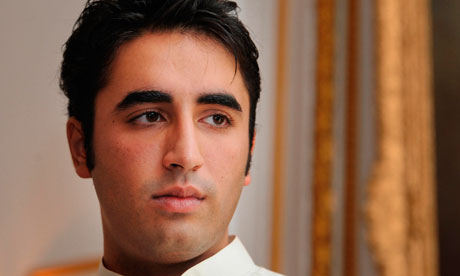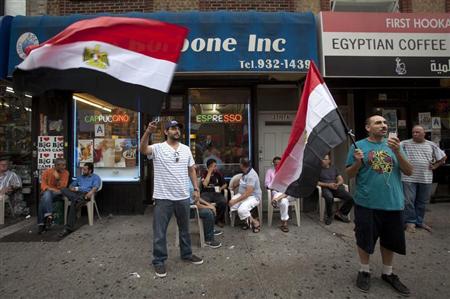
The Obama administration is treading carefully after Egypt's military overthrew its president, wary of taking sides in a conflict that pits a democratically elected leader against a people's aspirations for prosperity and inclusive government.
Denounce the ouster of President Mohammed Morsi outright, and the U.S. could be accused of propping up a ruler who's lost the public's support — a prospect with eerie echoes of autocrat Hosni Mubarak, whom the U.S. supported for decades before the 2011 revolution that cleared the path to power for Morsi and his Muslim Brotherhood. But look the other way, and the U.S. could be accused of fomenting dissent or lose credibility on its commitment to the democratic process.
So President Barack Obama, in his first, cautiously crafted comments after Morsi was forcibly removed from office, said the U.S. would "not support particular individuals or political parties," acknowledging the "legitimate grievances of the Egyptian people" while also observing that Morsi, an Islamist, won his office in a legitimate election.
"We believe that ultimately the future of Egypt can only be determined by the Egyptian people," Obama said in a statement late Wednesday. "Nevertheless, we are deeply concerned by the decision of the Egyptian armed forces to remove President Morsi and suspend the Egyptian constitution."
He notably stopped short of labeling Morsi's ouster a coup, leaving himself some wiggle room to navigate a U.S. law that says the government must suspend foreign aid to any nation whose elected leader is ousted in a coup d'etat. But Obama did say he was ordering the government to assess what the developments portended for aid to Cairo. The U.S. considers the $1.5 billion a year it sends Egypt to be a critical U.S. national security priority.
"I now call on the Egyptian military to move quickly and responsibly to return full authority back to a democratically elected civilian government as soon as possible through an inclusive and transparent process, and to avoid any arbitrary arrests of President Morsi and his supporters," Obama said after huddling in the White House Situation Room with Defense Secretary Chuck Hagel and other top aides.
Egyptian military leaders have assured the Obama administration that they were not interested in long-term rule following their toppling of Morsi. On Thursday, the supreme justice of Egypt's Supreme Constitutional Court, Adly Mansour, was sworn in as interim president.
On his other request, Obama appeared to have less success. Shortly after Obama issued his statement, a Muslim Brotherhood spokesman said Morsi and 12 presidential aides had been placed under house arrest. Morsi, meanwhile, denounced his ouster as a "full coup."
As American cities were making final preparations for Fourth of July celebrations, fireworks erupted Wednesday night over Cairo's Tahrir square upon news the military had suspended the Islamist-drafted constitution and called for new elections.
The mood was less jubilant at the State Department, where officials concerned about the threat of further unrest ordered all nonessential U.S. diplomats and the families of all American embassy personnel to leave Egypt.
Although initially encouraged by Morsi's promise to abide by Egypt's 1979 peace treaty with Israel and his role in a truce brokered between Israel and Gaza's Hamas rulers in November, the U.S. grew more skeptical about Morsi as opponents complained in louder and louder voices that his promises to enact democratic reforms were going unmet. Secretary of State John Kerry warned in April that Egypt might be backsliding in its transition to democracy, citing arrests, street violence and the government's inability to embrace its opposition.
Despite the odd optics that supporting an expulsion-by-force of a democratically elected leader would entail, the State Department appeared Wednesday to be laying the groundwork for a tacit acceptance of the military's move. The State Department spokeswoman Jen Psaki refused to criticize Egypt's military over the ultimatum it gave Morsi. But she did say the U.S. was disappointed with a speech Morsi gave the previous night after Obama urged him to present plans to address the opposition's concerns.
"Last night was an opportunity for him to propose new steps, which he ... did not," Psaki said.
There were early signs that if Obama accepts the military's actions, he won't be without support on Capitol Hill. House Majority Leader Eric Cantor, a Republican, said Egyptians had made clear they believe Morsi threatens the type of democracy they aspired to in their 2011 revolution.
"As President Obama has said, democracy is about more than elections," Cantor said. "The Egyptian military has long been a key partner of the United States and a stabilizing force in the region, and is perhaps the only trusted national institution in Egypt today."
But other lawmakers were already asserting that Egypt's military had triggered a provision in U.S. law that requires aid to be suspended if a military deposes a democratically elected government. Sen. Patrick Leahy, who heads the Appropriations panel that oversees foreign aid, said he hoped Egypt's military would make good on its vow to return power to the people, but that in the meantime, U.S. law was clear about what should happen.
"My committee also will review future aid to the Egyptian government as we wait for a clearer picture," said Leahy, D-Vt.
In an apparent bid to forestall potential U.S. sanctions, senior Egyptian army officers have told Hagel and Gen. Martin Dempsey, chairman of the Joint Chiefs of Staff, that they would put a civilian government in place quickly — if not immediately — after removing Morsi from power, U.S. officials said. In the interim, they appointed a government of civilian technocrats to temporarily run the country.
The Egyptian military also pledged to take steps to ensure the safety of Americans in Egypt, including the embassy in Cairo and the consulate in Alexandria, said the officials, who spoke on condition of anonymity because they were not authorized to speak by name about private conversations that occurred over the past week.
Stephen McInerney, who runs the Washington-based Project on Middle East Democracy, said that while American leverage in Egypt's political conflict has diminished as a result of mistakes since the 2011 revolution, having the military back in charge could actually give the U.S. more influence over the outcome of the current turmoil.
"The actor we have the most leverage with — the military — is now the most important actor in Egypt," McInerney said.

 People across Punjab continue to suffer due to prolonged power outages amid scorching heat in the province.
Major cities have been facing up to 12-hour loadshedding with no letup in the hot weather. LESCO Chief has said for the first time a modern computerized centre has been established to monitor loadshedding.
He said that they had been receiving 2300 megawatt electricity quota. The LESCO chief said that they had been resorting to 10 hour loadshedding in all sectors to ensure equitable power outages.
He, however, conceded that sometimes the duration of power outages could increase due to technical faults in some areas.
People across Punjab continue to suffer due to prolonged power outages amid scorching heat in the province.
Major cities have been facing up to 12-hour loadshedding with no letup in the hot weather. LESCO Chief has said for the first time a modern computerized centre has been established to monitor loadshedding.
He said that they had been receiving 2300 megawatt electricity quota. The LESCO chief said that they had been resorting to 10 hour loadshedding in all sectors to ensure equitable power outages.
He, however, conceded that sometimes the duration of power outages could increase due to technical faults in some areas.

















